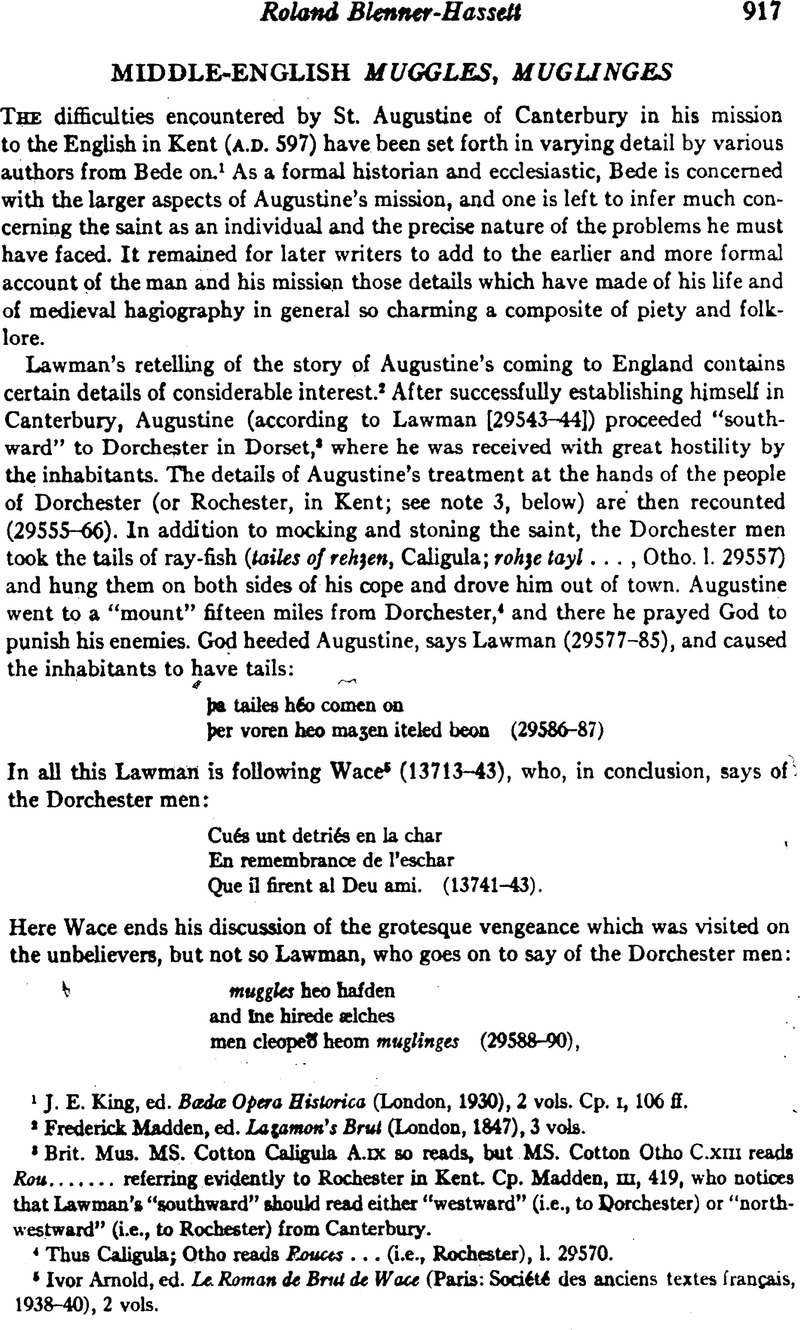Article contents
Middle-English Muggles, Muglinges
Published online by Cambridge University Press: 24 March 2021
Abstract

- Type
- Notes, Documents, and Critical Comment
- Information
- Copyright
- Copyright © Modern Language Association of America, 1953
References
1 J. E. King, ed. BadeOpera Historica (London, 1930), 2 vols. Cp, I,106 ff.
2 Frederick Madden ed. Lstawraw'sBrul (Landon, 1847). 3 vols
3 Brit. Mus. MS. Cotton Caligula A-IX so reads, but MS. Cotton OthoC.XIII reads Rou.……referring evidently to Rochester in Kent Cp. Madden, III, 419, who notices that Lawman's “southward” should read either “westward” (i.e, to Dorchester) or “northwestward” (i.e., to Rochester) iron Canterbury.
4 Thus Caligula; Otho reads Rouces … (i.e., Rochester), l 29570.
5 Ivor Arnold, ed. Le Roman de BrutdeWace (Paris: Société des ancienstextesfrançais, 1938-40), 2 vols.
6 Cp. Du Cange, Glossarium Media el InfimaLatinitatis (Paris, 1840-46), 6 vols., s.v. caudotus where the references to this aspersion on the English are so numerous and widespread as to signify a great diffusion of this folk-belief. See also J . S. P Tatlock— The legendary History of Britain (Berkeley, 1950), pp. 505-507—who reviews the literary dispersion of the folk-belief in great detail.
7 J. Wright, R. P. Wilkker, Anglo-SaxonandOld English Vocobularies (London, 1884), 2 vols. See 33, 21; 33,25; 180,31; 293,27; 319,12; 443,32; 447,37. Cp. John R. Clark Hall, A Concise Anglo-Saxon Dictionary (Cambridge, 1931); F. Holthausen, AltenglischesetymologischesWörterbuch (Heidelberg, 1934).
8 NED, s.v. “mullet” (1) says that today this name is applied to two pntn of fishes: e.g., (a) genus mullus, family Mullidae, (b) genus mugil, family Mugilidae.
9 Cp. Madden, III, 592, who glosses muggles “pl. ray-fish” and muglinges “a term of reproach, applied to those who wore the tails of ray-fish.” Madden is here taking his evidence directly from the text of Lawman. H. Bradley, ed., Stratriann'sMuddle-English Dictionary (Oxford, 1940), S.V. muggel sb. “tail” (the citation is from Fordun'sScotichronicon, q.v. below p. 6); S.V mugling sb. “tailed nan”: muglinges pl. (the citation is from the passage in Lawman quoted above).
10 Thomas Austin, ed., EETS 91 (London, 1888), p. 61.
11 See n. 9, above.
12 On the OE suffixing (as) “people (men) of” cp. A. Mawer and F. Îœ. StentonIntroductiontothe Survey of English Place-Names (Cambridge: English Place-Name Society, 1933), 1, pt. 1, 50-54; Allen Mawer, The Chief Elements in English Place-Names (Cambridge: English Place-Name Society, 1930), 1, pt. 2, 41-42; F. P. Magoun, Jr., “Territorial, Place-, and River-Name in the Old-English Chronicle, A-Test (Parker MS.),” Havard Studies and Notes in Philol.,XVIII (1935), 103.
13 Anton Fägersten, The Place-Names of Dorset (Uppsala, 1933). Cited as PNDo.
14 Eilert Ekwall, The Oxford Dictionary of English Place-Names (Oxford, 1940). Cited as DEPN.
15 Margaret Houck, Sources of the Roman de Brut of Wace,Univ, of Calif. Pub.in English (1941), v, ii, 337, n. 28.
16 P. Austin Nuttal, ed. FullerWorthiesofEngland (London, 1840), II, 113-124.
17 Cp. Wace 13789-96 for the same piece of folk etymology.
18 DEPN, 88; PNDo, 196-197 Jaarna Nichols, ed. Fuller's Church History of Britain (London, 1842), I, 99, rejects Lawman's etymology and says that in his. Fuller's day, the river-name was spelled Cern.
- 1
- Cited by


